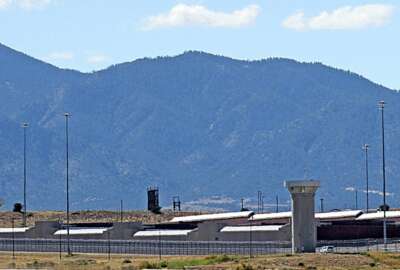
Bureau of Prisons employees union deals with both management and the inmates
Bureau of Prisons correctional officers, and nearly everyone is a correctional officer, operate in a crucible. They deal with Bureau management, which has trouble...
Follow the rest of Federal News Network’s series, The Worst Place to Work in the Federal Government.
Bureau of Prisons correctional officers, and nearly everyone is a correctional officer, operate in a crucible. They deal with Bureau management, which has trouble maintaining staffing and measuring its programs. Inmates are, well, inmates. Some are beyond redemption, some work to improve their lives. In the fourth interview in his series, The Worst Place to Work in the Federal Government, Federal Drive with Tom Temin talks with Shane Fausey, the President of the National Council of Prison Locals, Council 33, of the American Federation of Government Employees.
Interview Transcript:
Tom Temin All right. The bureau did get the lowest rating in the best places to work. From your standpoint, why is that? What’s going on in there?
Shane Fausey So Tom, this is not a new revelation, to say the least. It’s been an evolution of cultural decline in the Bureau of Prisons. And you can see the the red flag factors that I call them, a $2 billion backlog in maintenance repair, the facilities, the COVID crisis, everything pointed to the staffing crisis, which is our biggest issue in our agency. We just don’t have enough correctional officers to supervise the bad guys.
Tom Temin That’s not an easy job, right? Is one of the reasons because people are just afraid to work in that type of context, or that as people come, they get law enforcement certification, they move on to maybe more glamorous law enforcement jobs.
Shane Fausey We see the retention is an issue and recruiting is becoming an issue. I think our pay scales have really lagged behind this hot economy that we’re in the middle of. We’re not unique to any other profession. We’re challenged in that area. But I have to really emphasize the extraordinary human beings, 35,000 of them that operate America’s federal prisons. And they do such an amazing, exemplary job with extremely limited resources.
Tom Temin And sometimes shifts can barely be covered then with only 35, because I think there’s 40,000 are authorized. But if there’s only 35,000 and there’s a gap of five or 6000, this is the latest reporting from GAO, then just simply covering shifts is a pretty crucial situation in a federal prison, isn’t it?
Shane Fausey It is. And I worked very closely with Ms. Goodwin in the GAO and some of their reports over the years. And this has been a steady decline since about 2005 when the agency executed the mission critical cuts. But it really kind of pushed us over the cliff, the staffing cuts of 2016, 2017, when we lost collectively 7000 positions. Currently, there is about 8,000 vacancies from the authorized positions in the Bureau of Prisons.
Tom Temin And if you would, just maybe give us a quick picture of the daily life of a corrections officer. How close to the inmates physically are officers? Are they armed because that might be dangerous in a prison setting? It’s a social situation. It’s a law enforcement situation. It’s a psychological situation, I would think.
Shane Fausey Our profession is so broadly described. We’re not guards, number one. We are correctional officers. We deal with real, tangible human beings. And the 80%, we’re actively trying to salvage them as human beings and get them back into society as a productive member. The other 20%, quite frankly, you don’t want them in society. They’re so dangerous. And it’s such a balance when you walk around the housing unit. You don’t see the Shawshank Redemption version that Hollywood portrays. We’re human beings interacting with 150, 200 human beings in a very social setting. Not everybody secure behind a wall or out moving around, going to the commissary to the dining hall. It’s really a unique human experience to witness, and I challenge anybody that has the opportunity to experience it for themselves.
Tom Temin Yeah. And so there is sometimes physical danger, but then there’s also I mean, the word correction is part of the title of the job. And as you say, there are plenty of people that you feel like you really want to help and want to be helped. Fair?
Shane Fausey That’s a fair assessment. And I can tell you we’ve helped more people than we have harmed over the hundred years of the bureau’s evolution. We’ve made good human beings out of people that made mistakes in their lives and ended up in a really bad place. Unfortunately, as you navigate this environment, danger lurks around every corner, not just for ourselves, but for the other offenders that live there as well.
Tom Temin We’re speaking with Shane Fausey. He is president of the National Council of Prison Locals of the American Federation of Government Employees. What do you feel, BOP Management needs to do to get the staffing at full level? And how our relations with the management in general between the corrections officers, the union and the people running the prisons and running the agency.
Shane Fausey So at the national level, we’ve been really focused collectively on hiring. And this has been an issue for us, like I said, for many, many years now. But it’s become, you can’t hide statistical data we’re seeing. It’s real human costs to a lack of supervision. So we’re focusing a lot of funding on recruiting new people into this business. I can tell you it’s a good job. It has great benefits. And I think we’re the pinnacle of corrections as an agency. I just did a recent event in Colorado with an assembly of corrections professionals from across the world. And I found very quickly we’re a model for the rest of the world that they follow what we do. So we just have to fix the staffing crisis, which affects everything, Tom, every aspect of our business. If you don’t have enough supervision, bad things happen.
Tom Temin So if the staffing were to restore to the full allocated authorized staffing and those five or 6000, 7000 maybe holes were filled with good employees, would that affect the best places to work score?
Shane Fausey I absolutely think it will. I think the score that you’re seeing is a reflection of collective exhaustion. Our officers, our employees, they’re tired. They’ve been holding the line for at least ten years under extreme conditions. If they hired fully to 100%, you would see a decline in contraband. You would see a decline in violence. You will see a decline in suicide. Like I said, those conditions we’re in right now have real human consequences.
Tom Temin I imagine seeing or witnessing or being exposed to the violence, say, prisoners among themselves, even though the officer may not be directly involved, that must have a psychological or some kind of debilitating effect just to witness that.
Shane Fausey That’s a fair assessment. Sustained exposure to violence or threats of violence for long periods of time like corrections does, gave us a new priority is focusing on employee wellness and trying to prevent or treat post-traumatic stress disorder and things that develop throughout the career. And I think the new director is right on board with employee wellness.
Tom Temin What’s, in your opinion, the best way to deal with those occasional officers that go off the rails themselves?
Shane Fausey Tom, I testified for the Senate when we identify a bad egg, get them out of our prisons. We don’t want them there just as much as society doesn’t want them there. They’re a decay or a cancer that can affect the entire institution and a level of safety for every employee. So if you’re a criminal, you don’t belong in this business and you need to go.
Tom Temin And what about the issue of hiring with respect to the local of prisons? That is to say they’re in rural areas in many cases, and they’re far away from big population centers. You have a limited pool of people available. How does that affect the recruiting and hiring?
Shane Fausey So it’s really hard to attract someone out into. And a lot of our institutions are in rural locations. We’re working on a piece of legislation right now to kind of address that issue because we’re competing with that same metropolitan areas pay scale. But we’re living so far remote from that area. Most people, we have to incentivize them to move to those remote locations.
Tom Temin What would your selling proposition be to someone who just say graduated in a law enforcement or criminal justice program at a college in or near a large metropolitan area to go to a Florence, Colorado, or someplace like that, Allenwood, Pennsylvania, far from Philadelphia or Pittsburgh, whatever? What’s the what’s the unique selling proposition of the job, do you think?
Shane Fausey So we have a couple of incentives that we’ve launched. One is a $10,000 sign on bonus across the country, not just at those locations that you mentioned. We have a recruiting bonus for employees to our best recruiters, are our own employees, but we also have location centers for our most hard to fill locations. Florence is one, and has a 25% incentive. So unfortunately, it’s like sticking your fingers in a dam and eventually you run out of fingers and the dam is still cracking. We need to address the pay scale across the country to incentivize corrections to those people working at other employers like Target and Walmart. They’re offering so much more on an hourly wage. And I think what we’re noticing, Tom, the younger generation doesn’t understand the tangible benefits of retirement funds and health care, like the older workers who did. So I think we need to incentivize them with dollar signs.
Tom Temin But what about the job itself that would attract someone to say, I’d like to do this? Is there a calling quality to it? Or is there something inherently satisfying about this work that you could also try to convince people of?
Shane Fausey Absolutely, Tom. 30 years in corrections this year, the first thing you notice is a cohesive teamwork or team concept. When something bad happens, you collectively respond and it really leaves an impact on you. When you’re in trouble and you see 30 or 40 of your coworkers responding to help you, not to mention the real tangible effects of protecting your community, there’s this level of service that’s so hard to describe until you’re actually feeling it yourself.
Tom Temin And you mentioned the backlog in maintenance and repair of the facilities. Does that affect only what the prisoners experience or does that also affect what the staff experiences?
Shane Fausey So it really affects every aspect of the facility or the multiple facilities, $2 billion backlog in infrastructure repairs, and I’m talking major mold, decay of the infrastructure itself, and it affects you mentally as well as physically. There’s a lot of offices you can’t use because they’re infested with mold and you don’t have the money to fix it, which is really strange. But I think the mental aspect, that cultural decline that I described earlier, when you come into work and the place is clean and painted and looks good, your mental state is a lot better than when you come in and there’s mold and dirt and the walls are falling down. It really has an impact on the collective workforce.
Tom Temin And are you hoping that the new director, Miss Peters, will be there a while? Because there has been a parade of directors and acting directors over the past several years, there’s been no real continuity at the top of BOP.
Shane Fausey The inconsistency in leadership affects any organization, but it’s really critical with our structure. I think I’m on my fifth director now as the national president. It is a constantly learning process, learning new priorities. I’m really hoping Ms. Peters sticks around for a while. So far in the honeymoon phase, we’re getting along pretty well and we have common focuses. So I think we’re moving forward. But as you know, trying to turn the bureaucracy around is like steering an aircraft carrier.
Follow the rest of Federal News Network’s series, The Worst Place to Work in the Federal Government.
Copyright © 2024 Federal News Network. All rights reserved. This website is not intended for users located within the European Economic Area.
Tom Temin is host of the Federal Drive and has been providing insight on federal technology and management issues for more than 30 years.
Follow @tteminWFED





